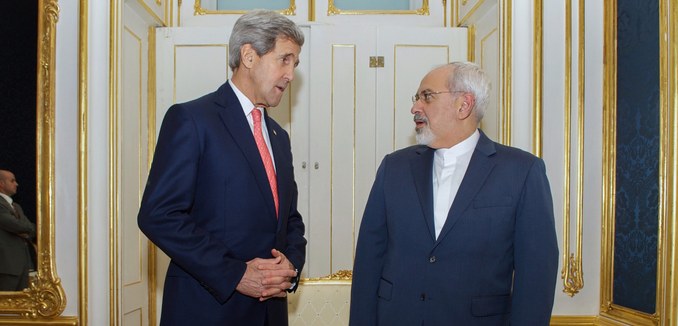Secretary of State John Kerry wrote a letter to his Iranian counterpart on Saturday to assure him that in order to avoid Iranian claims that the U.S is violating the nuclear deal, the White House will largely ignore recent legislation tightening visa requirements, sparking concerns that the Obama Administration is undermining Congressional authority to satisfy Iranian demands.
After the San Bernardino terror attacks earlier this month, Congress passed legislation, which was signed by President Barack Obama, that would restrict the automatic granting of visas to individuals who travel to Iran, a country that the State Department designates as a leading state sponsor of terror. Iranian Foreign Minister Mohammad Javad Zarif complained over the weekend that the visa restrictions were a new sanction on Iran, which he believed would violate the nuclear deal. (The deal, formally known as the Joint Comprehensive Plan of Action or JCPOA, prevents the United States from placing new sanctions on Iran in response to nuclear work, but the U.S. can still sanction Iran for its sponsorship of terrorism, as Kerry has repeatedly stated). In his letter, Kerry reassured Zarif that he is “confident that the recent changes in visa requirements passed in Congress, which the Administration has the authority to waive, will not in any way prevent us from meeting our JCPOA commitments.”
Iran’s complaint about the visa restrictions came amid closer scrutiny of its nuclear and military activities by Congress and the Obama Administration. The United Nations found last week that an Iranian ballistic missile test in October violated a Security Council resolution.
“If we fail in any way to relentlessly enforce what we’ve got in terms of both U.S. unilateral and multilateral abilities to constrain Iran’s actions, they will take that as a clear signal that we’ve taken our eye off the ball,” Sen. Chris Coons (D-Del.) told the Wall Street Journal on Thursday. Over the weekend, Congressional sources told the Washington Free Beacon that they were concerned that the White House was undercutting anti-terror measures to placate Iran and keep the nuclear deal on track.
“According to the Obama administration’s latest interpretation, the nuclear deal allows Iran to test ballistic missiles in violation of international law, but does not allow Congress to prevent terrorists from coming into the United States,” Omri Ceren, the managing director of press and strategy at The Israel Project, told the Washington Free Beacon. The Israel Project published The Tower.
The full text of the letter to Zarif is embedded below:
Sec Kerry's letter to FM Zarif about Visa Waiver program. #Iran#JCPOA #IranDeal#AbsurdLegislation pic.twitter.com/Aef0IFHmZn
— Sadegh Ghorbani (@GhorbaniSadegh) December 20, 2015
Iran’s concerns that American legislation could hurt economic progress comes in the wake of increased anti-American activity and rhetoric by Islamic Republic leaders. Three days after the nuclear deal was signed in July, Iranian Supreme Leader Ayatollah Ali Khamenei tweeted an image of President Barack Obama with a gun to his head, threatening the “aggressive and criminal U.S.” In September, Khamenei declared that Iran would defeat the U.S. in the event of a war.
Last week, Iran banned the importation of more than 200 American products, following a directive issued by Khamenei in November. The regime recently arrested Iranian-American businessman Siamak Namazi and Lebanese-born U.S. resident Nizar Zakka. Last month, Iran also executed Hamid Samiee, a dual Iranian-American citizen it had been holding since 2008.
In October, Iran announced the conviction of Washington Post reporter Jason Rezaian on charges of espionage, and later sentenced him to prison for an unspecified length of time. A senior Iranian official accused Rezaian of conspiring with the U.S. government to topple the regime in Tehran.
Khamenei’s office also published a video last month accusing the U.S. of orchestrating the deadly November 13 terror attacks in Paris. A little over a week later, Khamenei warned that the U.S. was using “money and sexual attractions” to infiltrate the Islamic Republic.
[Photo: UNVIE U.S. Mission to International Organizations in Vienna / Flickr ]




